As COVID-19 continues to affect so many aspects of life, disputes caused by COVID-19 have increased and evolved. Lex Machina is tracking cases that have been filed due to the coronavirus health crisis or related societal changes. Previously, we tracked new litigation caused by COVID-19 for federal district court cases filed March 1 through May 2, 2020 and provided an update looking at March 1 through July 4, 2020. This blog post provides an update looking at January 1 through August 31, 2020.
Takeaways:
Methodology
Lex Machina created a case tag that allows users to view and analyze cases with claims that were directly caused by, or were significantly impacted by, the coronavirus health crisis or related societal changes. This tag combines machine learning and attorney review. First, Lex Machina’s automated tagging system looks for possible COVID-related litigation by keyword searching and document tagging. This system is run over all federal district court cases in the system filed January 1, 2020 or later, which includes all civil cases from PACER except the prisoner petitions and social security cases. Then the Lex Machina team of legal experts reviews those cases to verify whether the case was filed as a result of the COVID-19 crisis.
A case will receive the COVID-19 case tag if it was filed January 1, 2020 or later and satisfies either one of the following two criterion:
The COVID-19 case tag is now available in the Lex Machina software, which means that users can view the analytics discussed below. However, the numbers may update as new filings in PACER become available.
Cases Caused by the COVID-19 Crisis Over Time
From January through August, 3,362 cases were filed due to the COVID-19 pandemic. As shown in the figure below, case filings ramped up in March and April, then peaked in May with 802 cases. In August, they fell to 660 cases. This may be part of the regular summer slow down, but may also be a lull in filings as the first wave of cases make their way through the system. Potential plaintiffs may be waiting to see how judges rule before filing their case. For example, they may wait to see how a judge rules in a business interruption case or contracts case before deciding whether they want to move forward with filing suit.
Cases Caused by the COVID-19 by Month
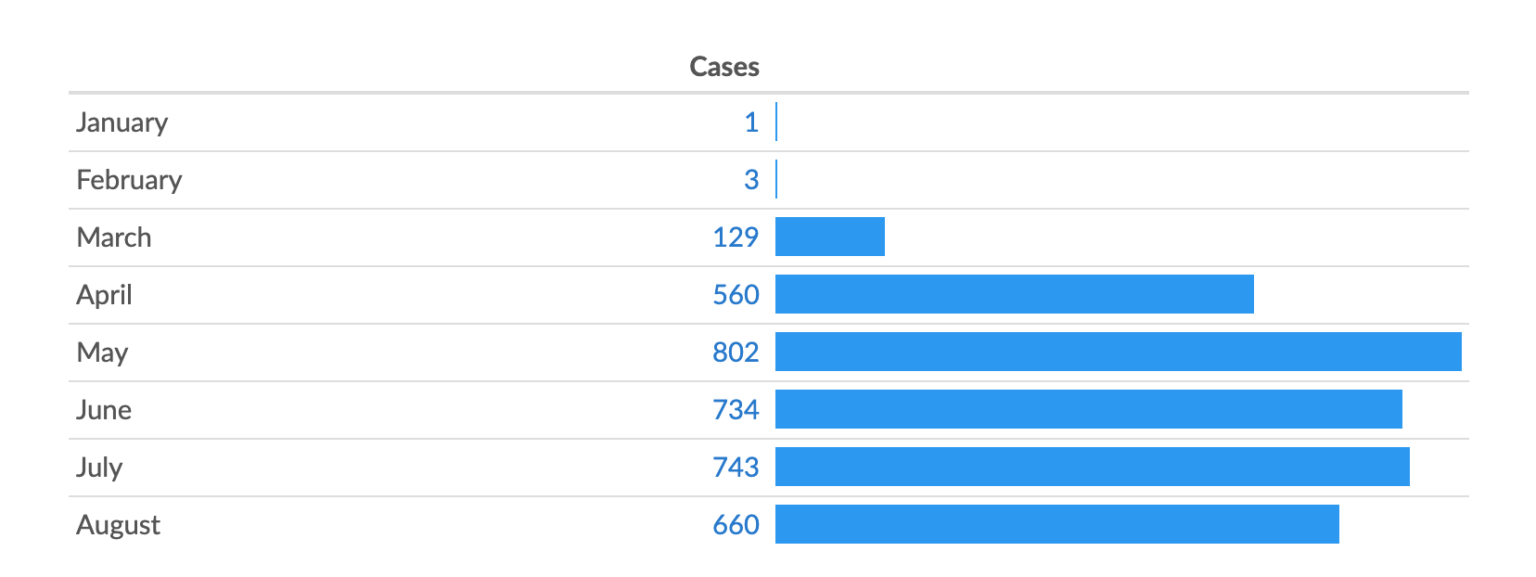
Public Source: Lex Machina’s COVID-19 Impact Analyzer App (data current as of 9/28/2020)
Cases Caused by the COVID-19 Crisis by Practice Area
Insurance was the leading practice area with cases caused by COVID-19. As businesses look to have their losses due to shutdowns covered by insurance, they made a record number of business interruption claims in 2020. Out of 692 insurance cases caused by COVID-19, 640 included business interruption claims.
Contracts followed insurance with 688 cases, only four fewer than insurance. Employment cases were third with only 209 filed; however, cases in this practice area are steadily growing and we expect them to continue as COVID-19 infections continue to strain the employer/employee relationship. These three practice areas are looked at in further detail in the next section.
Consumer protection, securities, and torts all had over 100 cases, trademark had 69 cases, and all others had fewer than 25 cases. Tax was the only practice area with no cases caused by COVID-19, which may change as the economy is strained. Our tax practice area covers cases filed in federal district court (i.e., disputes over tax liability, tax preparation, or a tax lien or levy on property) which may take some time before they are ripe for adjudication.
Cases need not belong to a practice area. Additionally, 1,643 cases were within the “remaining federal” case type, which included many civil rights and constitutional cases. A case may belong to more than one practice area if it alleged claims covered by more than one practice area. For example, many trade secret cases also included contracts claims.
New Cases Caused by the COVID-19 Crisis by Practice Area
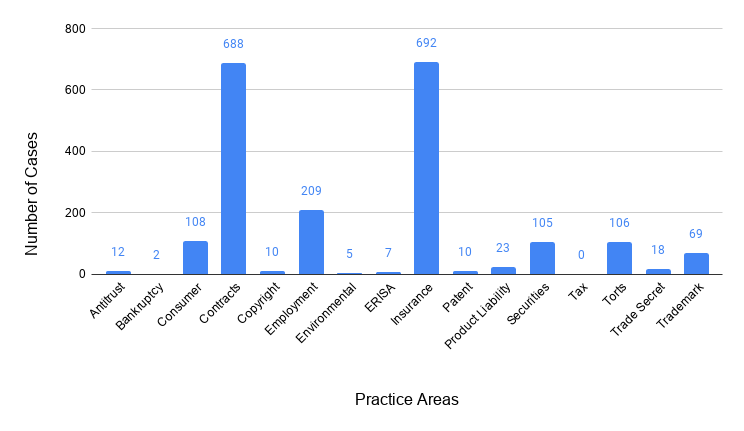
Tracking Monthly Filings for Cases Caused by the COVID-19 Crisis – Top Three Practice Areas
The figure below breaks down by month the number of case filings caused by the COVID-19 crisis in the three top practice areas. (Specific dates, as labeled on the figure, were used in order to include four full weeks each month.) There was a month-over-month increase in all four groups from March 8 to May 30, 2020. While employment cases caused by COVID-19 continued to increase into August, cases from the other three groups have plateaued.
Monthly Filings for Cases Caused by the COVID-19 Crisis – Top Three Practice Areas
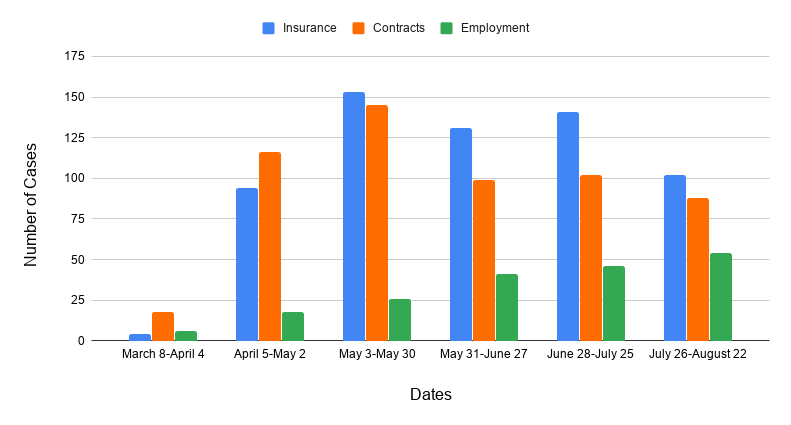
Analyzing Cases Caused By COVID-19 By Practice Area
The COVID-19 crisis has consequences for a broad range of social and economic sectors in the United States. Lex Machina’s legal data experts reviewed federal district court cases citing COVID-19 keywords in order to verify the 3,362 cases caused by COVID-19, and shared their observations on the new cases filed.
Antitrust
Six new antitrust cases caused by COVID-19 were filed from July 5 through the end of August (since our last blog post). In two of these cases, both class actions, plaintiffs claimed defendants were taking advantage of the current situation to overcharge for access to food, which was already challenging due to the health and safety problems of the health crisis. In Olean Wholesale Grocery Cooperative, Inc. v. Cargill, Inc. et al, the grocery cooperative accused Cargill and other defendants of engaging in an ongoing conspiracy to inflate beef prices that dates back to at least 2015, and using the COVID-19 crisis to extend and expand that conspiracy.
In the second case, Eliades et al v. Grubhub Inc. et al, plaintiffs contended that internet-based restaurant delivery services Grubhub, Uber, and Postmates were charging restaurants delivery rates at or near 30% despite legislation that prohibits restaurant commission rates above 15% during the COVID-19 pandemic. These rates are striking, especially when viewed in combination with the challenges restaurants are facing, since most are heavily or completely dependent on delivery while the COVID-19 crisis continues.
Two other antitrust cases involved costs and finances during the crisis. In Epic Games, Inc. v. Apple Inc., Apple removed key apps from its app store, including plaintiff’s Fortnite, impacting home entertainment cost and access during a time when many were unable to leave home. In Braman Hyundai, Inc. v. Hyundai Motor America Corporation et al, plaintiff car dealers claimed the Hyundai corporation took advantage of the COVID-19 crisis to alter bonus terms paid to car dealers, to their loss and to the benefit of the corporation.
Bankruptcy
So far, we have only seen two bankruptcy cases caused by the COVID-19 pandemic in federal district court, both of which were filed in July. In both of these cases, debtors challenged the constitutionality of a specific exception in the CARES Act that denies PPP benefits to entities currently in bankruptcy. All Sorts of Services of America, Inc. v. The U.S. Small Business Administration et al was filed in the Middle District of Florida and United States Small Business Administration et al v. Alaska Urological Institute, P.C. was filed in the District of Alaska. Both of these cases ended with permanent injunctions against the United States government in favor of the debtors.
We expect COVID-related Bankruptcy litigation to increase as the pandemic’s economic impact continues.
Consumer Protection
Fair Debt Collection Practices Act (FDCPA) cases continued to predominate Consumer Protection cases caused by the COVID-19 pandemic. Many of these cases involved consumers who could not repay debts because their income had been impacted by the coronavirus. Out of 108 consumer protection cases filed between January and August, 33 terminated. These cases mostly ended in settlement or procedural resolutions. Klein v. Thunderbird Collection Specialists Incorporated et al, filed in the District of Arizona, terminated in a consent judgment for the plaintiff in the amount of $3,001.00 plus attorneys’ fees and costs.
Cases alleging Telephone Consumer Protection Act (TCPA) violations were the second-most prevalent Consumer Protection cases caused by COVID-19. In many of these cases, defendants were using automatic texting and dialing to contact consumers who relied on their mobile devices for work and zoom meetings, making unauthorized interruptions worse. In other cases, telemarketers were sending text and call blasts selling COVID-related services such as testing services and treatments for COVID-19.
Plaintiffs also filed Unfair/Deceptive Trade Practices Act (UDTPA) and Fair Credit Reporting Act (FCRA) cases due to the pandemic. Many UDTPA and FCRA cases were backlash cases where consumers accepted offers from financial companies to defer credit card or loan payments without penalty. However, consumers alleged a violation of UDTPA statutes and FCRA because the deferred payments showed up as late payments on consumers credit reports and had a negative impact on their credit reports.
Contracts
Fredmark, L.L.C. v. Zax, LLC is the first contracts case caused by COVID-19 decided on the merits. In that case, a Zaxby’s restaurant attempted to terminate its lease due to the shutdown orders in Georgia. Judge Timothy C. Batten Sr. found in favor of the lessor that the Governor’s shutdown orders did not give cause for Zaxby’s to terminate its lease and determined it was in breach. This was a partial summary judgment finding and the case remains open. This was just one of many cases where plaintiffs alleged breach of a commercial lease due to the pandemic.
The CARES Act generated a significant number of lawsuits alleging breach of contract and/or other business torts such as negligence, fraud, and tortious interference with contract. Wells Fargo Bank was the top defendant in the CARES Act cases, followed by JPMorgan Chase Bank. The CARES Act cases fell into two categories. First, agents (designated under the CARES Act) who sought payment under the Act for providing assistance with PPP loans. Second, businesses who sued banks, alleging that the banks failed to follow the procedures required by the CARES Act in determining priority for PPP loans, particularly in failing to follow the first-come, first-served rule set forth in the Act.
COVID-19 continues to drive the filing of a significant number of class action lawsuits in the contracts practice area. Over 200 class actions have been filed against universities and colleges, seeking refunds of tuition money due to the termination of in-person classes. Similarly, class action lawsuits continue to be filed against airlines, seeking refunds (as opposed to credits) for flights cancelled due to COVID-19.
Other actions seeking refunds were filed against ski resorts (seeking refunds for unused ski passes), entertainment ticket vendors such as StubHub (seeking refunds for cancelled events), gyms (for failing to refund amounts charged while gyms remained closed), and other venues such as convention centers and resorts (seeking refunds for cancelled events). Plaintiffs also filed suits against manufacturers and sellers of personal protective equipment, primarily for failing to manufacture or sell the quantity of equipment specified by contract.
Zoom Video Communications appeared as a defendant in seven contracts cases. Users sued Zoom primarily for two reasons. First, users were subjected to what is known as “zoom bombing.” Zoom bombing occurs when a user’s screen is hijacked, the users are then subjected to offensive material and are unable to exit the meeting. Also, suits were filed because of Zoom’s failure to provide data privacy and security for its users.
Out of 688 cases caused by COVID-19 in the contracts practice area, somewhat surprisingly, 206 have already been terminated. The vast majority of those cases (201) were terminated either by settlement/voluntary dismissal or a procedural resolution. The five remaining cases were resolved either by a consent judgment (three cases) or a default judgment (two cases).
Copyright
Lex Machina found 10 copyright cases caused by COVID-19, mostly alleging infringement of COVID-related materials, such as masks, photographs, and news articles. Three cases were filed since our last blog post, including Amazon Content Services LLC et al v. Kiss Library et al. In that case, Amazon and Penguin Random House alleged defendants were pirating books published by plaintiffs. According to the complaint, “economic harm caused by Defendants’ digital piracy has been compounded during the COVID-19 pandemic—when readers are quarantined to their homes and increasingly reliant on ebooks.”
Copyright case filings remained relatively steady over the course of 2020 (900 cases in Q1, 720 cases in Q2, and 804 cases so far in Q3). However, file-sharing cases dipped in Q2 (60 cases) but are rebounding in Q3 (268 cases). File-sharing cases involve claims of infringement for BitTorrent/P2P file sharing brought against anonymous John Doe defendants or anonymous defendants’ IP addresses, and they are generally filed by a small number of plaintiffs. These plaintiffs seemed to take a break during the beginning months of the pandemic in Q2, but have gone back to filing large numbers of cases in recent months.
Employment
From March through August, the Southern District of New York and the Southern District of Florida were the venues with the highest number of pandemic-related employment filings. Both locations had high levels of COVID-19 infections. The leading allegations by plaintiffs were retaliation claims followed closely by FMLA violations. Out of 209 employment cases caused by COVID-19, 21 cases have settled. Employers have had a difficult time determining how to properly follow the new employment laws enacted by Congress, such as the Families First Coronavirus Response Act.
When reviewing fact patterns in this practice area, it became clear why so many of these cases settled. For instance, in Constance v. Hollybrook Golf and Tennis Club Condominium, Inc., the plaintiff worked at a 55-and-older community and reported that he was experiencing virus symptoms out of an abundance of caution. Plaintiff eventually tested positive and was told by his employer not to inform residents or other employees. One of the plaintiff’s coworkers eventually passed away from the virus. When the plaintiff recovered, he was terminated the day he reported back to work. The case settled in less than two months.
In Gomes v. Pitney Bowes, Inc., the plaintiff worked for Pitney Bowes for over 10 years. On March 18, 2020, plaintiff contracted the virus and was ordered to isolate by his primary doctor. He informed his employer of his diagnosis and isolation orders. On March 25, 2020, plaintiff received a letter notifying him that his employment was being terminated because of poor attendance in connection with his absence from work following his self-quarantine order. The case settled in less than two months.
The fight between healthcare employee plaintiffs and healthcare employer defendants continued as COVID-19 infections and lack of PPE remained a litigation sticking point. In Nurse Anonymous v. Good Samaritan Hospital of Suffern NY et al, the hospital employer allegedly did not provide the plaintiff with a proper personal protection (PPE) mask, even though she was working in the ICU with a COVID-19-positive patient who eventually passed away. The plaintiff, an anonymous nurse, had an underlying condition and contracted the virus. During her absence, the plaintiff learned there were over 60 people out on sick leave allegedly due to inadequate PPE. As healthcare workers continue to fight PPE shortages, these types of cases will likely continue to be filed.
Environmental
Five environmental cases filed since March resulted from the COVID-19 crisis. Since our last blog post, three cases were filed. In Riverkeeper, Inc. et al v. United States Environmental Protection Agency et al, the plaintiffs challenged the non-enforcement policy in relation to the Endangered Species Act. In West v. Azar et al, the plaintiffs alleged that “the defendants violated NEPA and took an arbitrary and capricious administrative action by radically restructuring the activities of the HHS and CDC in regard to the critical function of Coronavirus data collection and reporting . . . .” The final case, Bold Alliance et al v. U.S. Department of the Interior et al, concerned construction of the keystone pipeline and alleged that “the influx of thousands of workers is a direct public health threat in light of the ongoing COVID-19 pandemic.”
ERISA
Only seven pandemic-related ERISA cases have been filed as of August 2020. Some of these cases included claims that short-term disability was denied or wrongful termination claims entwined with ERISA claims. For instance, in Hermes v. Oklahoma Arthritis Center PC, the plaintiff alleged that she had expressed concern, due to her underlying condition, that the safety protocols were not being followed in the workplace. The plaintiff was terminated while at home for failure to report. The plaintiff brought suit alleging ERISA violations for wrongful loss of medical benefits. Similarly, in Waldbaum v. Hartford Life and Accident Insurance Company et al, a nurse anesthetist with underlying health conditions was denied short-term disability. The defendant insurance company took the position that the plaintiff’s claim was premature and she had not suffered any medical complications that would warrant short-term disability pay. ERISA will likely remain a practice area with few COVID-related cases.
Insurance
The outbreak of COVID-19 has resulted in a dramatic increase in federal court filings related to business interruption coverage. Out of 692 insurance cases caused by COVID, 640 included business interruption claims. While the Judicial Panel on Multidistrict Litigation declined to create a nationwide MDL for all COVID-related business interruption claims, it is, as of this writing, considering whether to create five MDLs to handle business interruption cases involving Lloyd’s of London, Cincinnati Insurance, Hartford, Society Insurance Company, and Travelers.
Several other types of insurance coverage have been the subject of litigation related to the pandemic. For example, travel insurance policies and season ski pass insurance were the subject of several cases. Also, class actions were filed on behalf of policyholders seeking premium rebates on automobile and commercial general liability coverage because COVID-related restrictions reduced the claims risk to insurers. The numbers of these cases remain low, totalling fewer than 20 at this time.
Patent
Patent cases caused or exacerbated by COVID-19 have been few and far between. Since our last blog post, only one new patent case was filed due to COVID-19 (Blue Echo Care LLC v. Ackerman). Blue Echo Care is a small business that grew out of the need for personal protective gear during the COVID-19 crisis. The plaintiffs claimed that Ackerman’s earwashing patent was invalid due to the on-sale bar rule in patent law, and that the defendant used the Amazon IP Infringement complaint platform to drive Blue Echo out of business.
Product Liability
Plaintiffs filed 23 product liability complaints with allegations related to the COVID-19 outbreak. These cases were mostly part of two multidistrict litigation cases. Cases filed as part of MDL No. 2913 In re: Juul Labs, Inc., Marketing, Sales Practices, and Products Liability Litigation alleged that JUUL users are at greater risk of suffering more serious complications if they contract the coronavirus. Cases filed under MDL No. 2921 In re: Allergan Biocell Textured Breast Implant Products Liability Litigation alleged that plaintiffs suffered severe emotional distress because COVID-related restrictions prevented them from having their Allergan BIOCELL implants removed, and they remain subject to an increased risk of cancer allegedly associated with the implants. While neither MDL master case was considered “caused by COVID,” various associated cases did fit the definition.
Securities
Increased securities litigation is a natural result of the COVID crisis, where the extreme health and business upheavals cause instability, unpredictability, and opportunity. Between January and August, 105 securities cases were filed due to COVID-19. More than half of those were class actions. Most of these cases involved allegations of securities fraud or shareholder derivative actions. In addition, the US Supreme Court’s 2019 decision in Lorenzo v. SEC, which strengthened the plaintiffs’ and the SEC’s position in Rule 10b-5 cases, may lead to even more litigation, possibly with more plaintiff-friendly results.
In cases like Himmelberg v. Vaxart, Inc. et al, a securities fraud case, the plaintiffs accused the leaders of the company of making false or misleading statements about the company’s product and inflating the share price, ultimately costing investor shareholders. Defendant issued a press release in late June claiming that its COVID-19 vaccine had been selected to participate in “Operation Warp Speed,” a government-based initiative to find and administer a COVID-19 vaccine. This announcement sent the price of Vaxart shares rocketing higher. Then the business’ leaders modified limitations on stock sales and sold their shares at a temporarily inflated price. Once the public knew Vaxart was not actually selected for the initiative, well after many directors cashed in, Vaxart stock price plummeted.
A second group of cases involved shareholder derivative cases where companies were impacted by the COVID-19 crisis. In one case, In re United States Oil Fund LP Derivative Litigation, the plaintiff shareholders argued that the directors of the company misled shareholders about the “exceptional threats” to shareholder value of the oil industry price wars and the COVID-19 crisis.
Even the SEC stepped in and filed SEC vs. Complete Business Solutions Group, Inc. et al, which alleged that the defendants participated in a “fraudulent scheme” related to a combination of extremely high-interest business loans (upwards of 400% interest) and deception of approximately 1200 investors.
Tax
We have yet to see any tax cases in the District Court specifically caused by the onset COVID-19. However, we expect there will be many tax litigation filings in the coming months as the country continues to deal with the resulting economic fallout.
Torts
In torts, we have seen 106 cases caused by COVID-19 filed as of August 31, 2020. Most of these cases alleged negligence for failure to take reasonable measures to stop the spread of the coronavirus. Princess Cruise Lines, Ltd. was the most active defendant in torts cases caused by COVID-19, as plaintiffs sought to recover damages for emotional distress and trauma they suffered from the fear of developing COVID-19 while on the ship. In July, Judge R. Gary Klausner of the Central District of California decided in the defendant’s favor in 15 of the cases. The court ruled that plaintiffs need to satisfy the “zone of danger” test to recover for negligent infliction of emotional distress (NIED); they must have contracted the disease or exhibited symptoms of it. The plaintiffs could not recover for NIED based solely on their proximity to individuals with COVID-19 and resulting fear of contracting the disease.
Nursing homes and other health facilities continued to face gross negligence claims for their alleged poor infection control and precautions, and failure to comply with health protocols to keep their residents safe from the coronavirus. Likewise, class action case filings in federal courts against China and its various government entities correspondingly increased, with plaintiffs seeking enormous damages caused by mishandling of the COVID-19 outbreak.
Wrongful death legal battles against the meatpacking giant, Tyson Foods Inc., have also emerged. The families bringing these lawsuits claimed that Tyson failed to provide a safe work environment from the known dangers associated with the coronavirus, and that it has a questionable record of compliance with the Centers for Disease Control and Prevention (CDC) guidelines during the public health crisis, leading to the exposure of some workers to the virus and their eventual death.
This is likely just the beginning of tort litigation caused by COVID-19. We expect to see a great deal of tort litigation surrounding the pandemic in the coming months and years as individuals begin experiencing long-term effects.
Trade Secret
Trade Secret cases filed due to the pandemic tend either to be based on alleged trade secrets for technology used in virus prevention or testing, or cases where employees allegedly used their ability to work from home to steal trade secrets. As businesses struggled due to pandemic conditions, many of these cases met the second part of Lex Machina’s definition: “pandemic-related circumstances exacerbated a dispute.” Out of 18 cases filed between January and August, five have terminated, all with a stipulated dismissal or permanent injunction on consent.
Trademark
We have identified 69 trademark cases filed due to the pandemic. They mostly involved counterfeiting of COVID-related goods. Several mask suppliers filed counterfeiting cases, including 16 cases filed by 3M. Healthcare suppliers and cleaning supply companies also sued for infringement. Additionally, there were a string of cases that alleged that franchisees decided to rebrand while they were closed due to the pandemic. These were generally breach of contract cases, but they alleged trademark infringement if the defendants kept on using plaintiffs’ marks after the breach.
In Arizona Board of Regents v. Doe et al, Arizona State University filed suit against Doe Defendant for trademark infringement, false designation of origin, state law dilution, and unfair competition. It also sued Facebook for contributory infringement. The complaint alleged that an Instagram account using ASU’s trademarks was promoting a “so-called ‘Hoax-19’ Covid party, claiming that Covid-19 is ‘a big fat hoax,’ and spreading dangerous misinformation about Covid-19 just as students are returning to ASU’s campuses . . . .” Defendant filed an expletive-laden answer pro se and has since been ordered to file “an amended answer sans profanity and ad hominem attacks.”
Lex Machina includes false advertising claims under the Lanham Act in its trademark practice area. In In Defense of Animals et al v. Sanderson Farms, Inc., the plaintiff alleged that the defendant was making false claims about the nature of its chicken products. While the case was mostly about the defendant’s claim that its chicken is “100% Natural,” the plaintiff alleged that antibiotics given to its chickens were particularly dangerous in light of the pandemic. The plaintiff cited a link between antibiotic resistance in poultry products and COVID-19 patients with bacterial pneumonia.
Remaining Federal
On July 28, 2020, Lex Machina expanded its coverage to all commercially relevant federal district court cases. Cases that do not fit into one of the above practice areas are listed as “remaining federal.” Many of the cases caused by COVID-19 in this group were civil rights cases including constitutional challenges, voting rights lawsuits, and Americans with Disabilities Act (ADA) cases.
It is no surprise that there were a large number of lawsuits that alleged challenges to the constitutionality of various lockdown/shelter-in-place orders, closures of businesses, restrictions on travel, restrictions on religious activities, and mask requirements. These included both facial and as-applied challenges.
Voting rights lawsuits contended that election officials lacked meaningful emergency election plans. These lawsuits challenged restrictive absentee ballot requirements, failure to expand vote-by-mail opportunities, rigid voter registration and ballot initiative deadlines, and general refusals to ensure that in-person voting is safe for both poll workers and voters.
As workplaces have largely gone remote and online, ADA cases have spiked due to lack of accommodations, such as retailers failing to make their websites accessible to visually impaired individuals and other disabled persons.
Several complaints were filed challenging Immigration and Customs Enforcement’s directive that required in-person classroom instruction in order to maintain international students’ visas.
To learn more about the data behind this article and what Lex Machina has to offer, visit https://lexmachina.com/.







Sign up to receive our stories in your inbox.
Data is changing the speed of business. Investors, Corporations, and Governments are buying new, differentiated data to gain visibility make better decisions. Don't fall behind. Let us help.




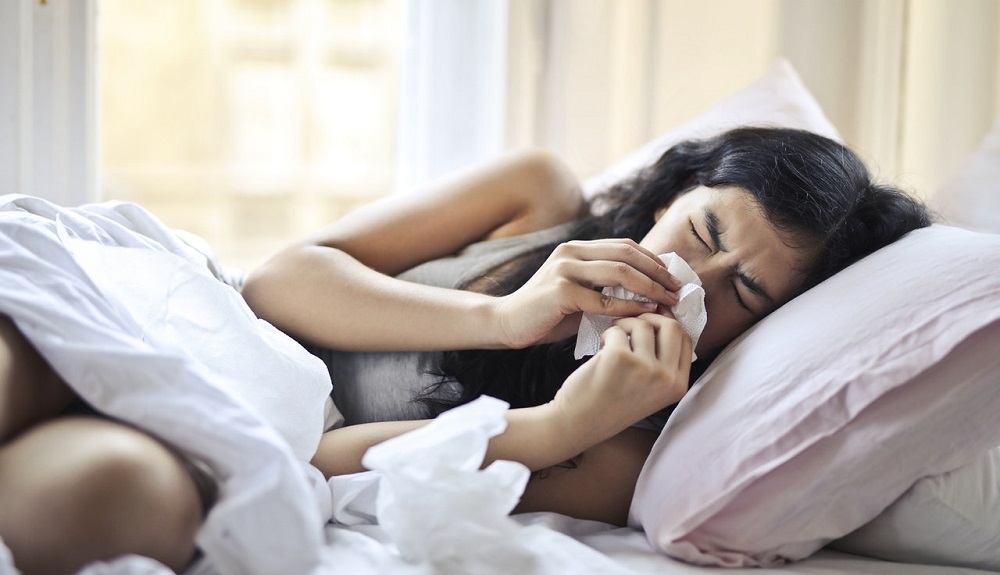
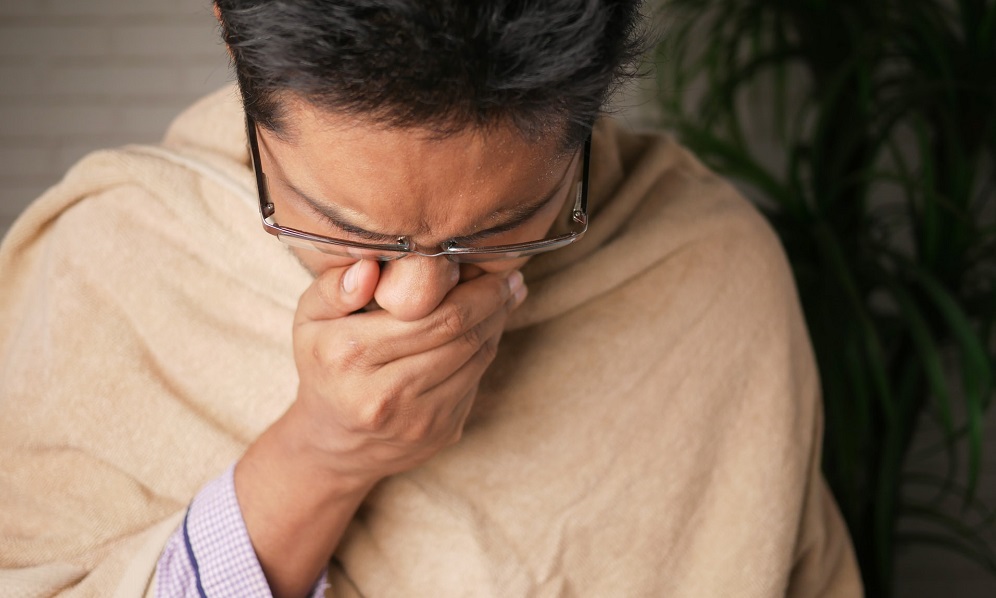







Sign up to receive our stories in your inbox.
Data is changing the speed of business. Investors, Corporations, and Governments are buying new, differentiated data to gain visibility make better decisions. Don't fall behind. Let us help.





